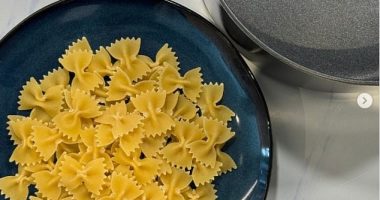Specifically, one in five cases diagnosed today is in a person under 55 years old—twice as many as in 1995, according to a study published in 2023 by the American Cancer Society. Some of the young people affected have taken to social media to share their early symptoms and experiences with the disease in hopes of raising awareness and helping others spot potential cases.
What can you do to mitigate your colon cancer risk? When honing in on lifestyle, nutrition experts recommend including more foods for colon health. “Nutrition and diet play a significant role in colon cancer risk,” says registered dietitian and oncology coach Nichole Andrews, RDN. Colorectal cancer risk also comes down to other lifestyle factors and genetic predispositions, but your diet is one of the things that is within your control. “Adopting a balanced and healthy diet with little to no alcohol are the most important aspects of reducing the risk of colon cancer,” she says. So, what does that look like, exactly? And are there certain foods for colon health we should all be loading up on?
Experts In This Article
Here’s what you need to know about how to prevent colon cancer with a healthy diet, including which are the best foods for colon health.
Diet and lifestyle changes for reducing colon cancer risk
The good news is that many of the same healthy lifestyle practices you’ve heard repeatedly (think: eat vegetables, stay active) are the same ones experts encourage for reducing colon cancer risk. The bad news is it only doubles down on the importance of making these changes; it’s not a matter of preference, weight loss, or aesthetics but of taking care of your health.
Here are the diet and lifestyle best practices Andrews recommends for optimal colon health.
Eat plenty of fiber and whole grains
Fiber gets a lot of hype for a reason. The nutrient helps promote regular bowel movements and may reduce the risk of colon cancer, Andrews says. “Aim to include plenty of fiber-rich foods in your diet, such as fruits, vegetables, whole grains, legumes, and nuts.”
Whole grains (such as brown rice, quinoa, whole wheat bread, and oatmeal) are especially rich in fiber and other nutrients that may help lower the risk of colon cancer, Andrews adds.
Limit red and processed meats
“Red meats (such as beef, pork, and lamb) and processed meats (such as bacon, sausage, and deli meats) have been linked to an increased risk of colon cancer,” Andrews says. Try to limit consumption of red meats and completely omit processed meats from your diet. “Opt for lean protein sources like poultry, fish, and plant-based proteins more often,” she adds.
Increase intake of fruits and vegetables
You’ve likely heard you should eat more fruits and veggies (after all, only one in 10 adults gets enough). Making that change is key for reducing colon cancer risk and promoting health in just about every other way possible. “Fruits and vegetables are rich in vitamins, minerals, antioxidants, and fiber, all of which may help reduce the risk of colon cancer,” Andrews says. “Aim to fill half your plate with colorful fruits and vegetables at each meal.”
“Fruits and vegetables are rich in vitamins, minerals, antioxidants, and fiber, all of which may help reduce the risk of colon cancer. Aim to fill half your plate with colorful fruits and vegetables at each meal.” —Nichole Andrews, RDN, oncology coach and registered dietitian
Limit saturated and trans fats
Not all fats are bad — in fact, they’re essential for your body to function — but there are certain types you should try to avoid for your health’s sake. “Limit intake of foods high in saturated fats (such as butter, cheese, and fatty cuts of meat) and avoid trans fats,” Andrews says. (The FDA has been working to ban trans fats since 2018, and they’re much less common in foods than they used to be.) Instead, choose healthier fats like olive oil, avocado, and nuts.
Stay hydrated
“Drink plenty of water throughout the day to stay hydrated and keep your digestive system functioning properly,” Andrews says. The exact amount you need will depend on your body and environment (and you do get about 20 percent of your hydration needs through food). Still, the Academy of Nutrition and Dietetics generally recommends consuming nine to 13 cups of fluid daily.
Avoid smoking and alcohol
Don’t just limit these habits; consider nixing them completely. “Smoking has been linked to an increased risk of colon cancer, as well as other types of cancer and chronic diseases,” Andrews says. And any alcohol consumption at all has been associated with an increased risk of colon cancer. “If you choose to drink alcohol, do so in moderation,” she says. That means limiting consumption to two drinks or less per day for men and one drink or less per day for women, according to the Dietary Guidelines for Americans (2020 – 2025).
Stay physically active
“Lack of movement is a risk factor for colon cancer,” Andrews says. The American Cancer Society recommends aiming for at least 150 minutes of moderate-intensity aerobic exercise or 75 minutes of vigorous-intensity aerobic exercise each week, plus doing strengthening activities on two or more days per week.
10 foods for colon health to stock up on
No one piece of produce or hype-y superfood will detonate your risk of disease or turn you into a glowing picture of health. However, if you’re unsure how to implement the guidelines above—or are looking to add specific foods to your diet that make you feel better about your colorectal health—consider these all-stars, recommended by Andrews. Each time you load up your plate with one, know you’re doing something good for your body, down to your colon.
Broccoli and other cruciferous vegetables
“Broccoli, cauliflower, Brussels sprouts, kale, and other cruciferous vegetables contain compounds called glucosinolates, which are broken down into biologically active compounds that have been shown to inhibit the development of colon cancer cells,” Andrews says.
Berries
Here’s another reason to sprinkle some of “nature’s candy” onto your yogurt or throw them into your smoothie. “Berries such as strawberries, blueberries, raspberries, and blackberries are rich in antioxidants, including polyphenols and flavonoids, which have been associated with a reduced risk of colon cancer by helping to combat oxidative stress and inflammation in the body,” Andrews explains.
Leafy greens
Leafy greens like spinach, kale, Swiss chard, and romaine lettuce are excellent sources of fiber, vitamins, minerals, and phytochemicals that support digestive health and may help protect against colon cancer, Andrews says.
Garlic and onions
They add flavor to just about everything and offer a boost for your digestive health, too. “Garlic and onions contain sulfur compounds and organosulfur compounds, such as allicin, which have been shown to have anti-cancer properties and may help inhibit the growth of colon cancer cells.”
Whole grains
You heard it above, but it bears repeating: “Whole grains like brown rice, quinoa, whole wheat, oats, and barley are rich in fiber, vitamins, minerals, and phytonutrients that promote digestive health and may help lower the risk of colon cancer by supporting regular bowel movements and reducing inflammation,” Andrews says.
Legumes
Reducing your red meat intake can open up space in your diet for more plant-based proteins, including beans, lentils, chickpeas, and other legumes. They’re all high in fiber, protein, vitamins, minerals, and phytonutrients that support digestive health, Andrews says. By promoting regular bowel movements and providing a source of plant-based protein, legumes may help reduce the risk of colon cancer, she explains.
Fatty fish
Fatty fish like salmon, mackerel, anchovies, sardines, and trout (SMASH fish, which are aces for longevity) are rich in omega-3 fatty acids. These fatty acids have anti-inflammatory properties and may help reduce the risk of colon cancer by decreasing inflammation in the body, Andrews says.
Turmeric
You’ve likely heard the benefits of turmeric. The golden spice contains a compound called curcumin, which has potent anti-inflammatory and antioxidant properties. It may help protect against colon cancer by reducing inflammation and oxidative stress in the body, Andrews explains.
Green tea
Green tea is rich in polyphenols, particularly catechins, which have been shown to have anti-cancer properties, Andrews says. These compounds may help reduce the risk of colon cancer by inhibiting the growth of cancer cells and promoting apoptosis (programmed cell death), she adds.
Yogurt and fermented foods
Fermented foods like yogurt, kefir, kimchi, and sauerkraut can boost your health in a multitude of ways. They contain beneficial probiotic bacteria that “support gut health and may help reduce the risk of colon cancer by promoting a healthy balance of gut microbiota and supporting immune function,” Andrews says.
Well+Good articles reference scientific, reliable, recent, robust studies to back up the information we share. You can trust us along your wellness journey.
- Song M, Wu K, Meyerhardt JA, et al. Fiber Intake and Survival After Colorectal Cancer Diagnosis. JAMAOncol. 2018;4(1):71–79. doi:10.1001/jamaoncol.2017.3684
- Lee, J., Shin, A., Oh, J. H., & Kim, J. (2017). Colors of vegetables and fruits and the risks of colorectal cancer. World journal of gastroenterology, 23(14), 2527–2538. https://doi.org/10.3748/wjg.v23.i14.2527
- Bai, X., Wei, H., Liu, W., Coker, O. O., Gou, H., Liu, C., Zhao, L., Li, C., Zhou, Y., Wang, G., Kang, W., Ng, E. K., & Yu, J. (2022). Cigarette smoke promotes colorectal cancer through modulation of gut microbiota and related metabolites. Gut, 71(12), 2439–2450. https://doi.org/10.1136/gutjnl-2021-325021
- Hazafa, A., Rehman, K. U., Jahan, N., & Jabeen, Z. (2020). The Role of Polyphenol (Flavonoids) Compounds in the Treatment of Cancer Cells. Nutrition and cancer, 72(3), 386–397. https://doi.org/10.1080/01635581.2019.1637006
- Shahidi, F., & Ambigaipalan, P. (2018). Omega-3 Polyunsaturated Fatty Acids and Their Health Benefits. Annual review of food science and technology, 9, 345–381. https://doi.org/10.1146/annurev-food-111317-095850
- Farhan M. (2022). Green Tea Catechins: Nature’s Way of Preventing and Treating Cancer. International journal of molecular sciences, 23(18), 10713. https://doi.org/10.3390/ijms231810713
- Giordano, A., & Tommonaro, G. (2019). Curcumin and Cancer. Nutrients, 11(10), 2376. https://doi.org/10.3390/nu11102376
- Nicastro, H. L., Ross, S. A., & Milner, J. A. (2015). Garlic and onions: their cancer prevention properties. Cancer prevention research (Philadelphia, Pa.), 8(3), 181–189. https://doi.org/10.1158/1940-6207.CAPR-14-0172
- Orouji, N., Asl, S. K., Taghipour, Z., Habtemariam, S., Nabavi, S. M., & Rahimi, R. (2023). Glucosinolates in cancer prevention and treatment: experimental and clinical evidence. Medical oncology (Northwood, London, England), 40(12), 344. https://doi.org/10.1007/s12032-023-02211-6
- Tarasiuk, A., Mosińska, P., & Fichna, J. (2018). The mechanisms linking obesity to colon cancer: An overview. Obesity research & clinical practice, 12(3), 251–259. https://doi.org/10.1016/j.orcp.2018.01.005
- Fedirko, V., Tramacere, I., Bagnardi, V., Rota, M., Scotti, L., Islami, F., Negri, E., Straif, K., Romieu, I., La Vecchia, C., Boffetta, P., & Jenab, M. (2011). Alcohol drinking and colorectal cancer risk: an overall and dose-response meta-analysis of published studies. Annals of oncology : official journal of the European Society for Medical Oncology, 22(9), 1958–1972. https://doi.org/10.1093/annonc/mdq653
- Aykan N. F. (2015). Red Meat and Colorectal Cancer. Oncology reviews, 9(1), 288. https://doi.org/10.4081/oncol.2015.288
Source: Well and Good





